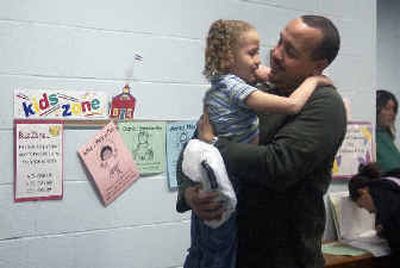Newest residents get Even Start

When Lynette Ramos goes to school, she shows up with her entire family.
Every day, you’ll find her at Keystone Center in Spokane Valley, taking classes to improve her English. Her husband, Jose Molina, sits in the classroom next door, also learning grammar and new words. Down the hall, their two daughters are enrolled in school and day care, where they also are immersed in the language of their new home.
Thanks to a federally funded program called Even Start, this young family from Puerto Rico can spend the day together in the same building as it learns English and adjusts to a new life.
Since it was established eight years ago in the Central Valley School District, Even Start has helped hundreds of families like the Molinas, not only by providing child care and courses in English and basic education but also by giving them bus tokens or gas vouchers and assisting them with other needs as they adapt to American culture.
Programs such as Even Start highlight growing diversity in Spokane County, where more than 50 different languages are spoken.
According to the latest census figures, nearly 30,000 people over the age of 5 in this county speak a language other than English at home. The most recent state report on bilingual education also shows that in 2001, nearly 1,300 students attending public schools in Spokane County were learning English for the first time. Statewide that year, 72,215 students spoke Spanish, Russian, Ukrainian or one of 187 other languages.
While kids naturally pick up English at school, adults who are new to this country often learn the new language through Community Colleges of Spokane’s Institute for Extended Learning.
Even Start, however, takes learning a step further by helping both parents and children.
“The most powerful intervention is to serve the whole family, not just the child,” said Marcia Harrington, Even Start’s program coordinator at Keystone Center.
Even Start started nationwide in 1989, but the one administered by Central Valley School District began in 1997 after the district won a competitive grant. Now, Central Valley – which runs the program with help from the Institute for Extended Learning – receives about $237,000 annually to implement Even Start.
The program, however, could be on the chopping block. President Bush’s proposed $2.5 trillion budget in February is targeting 150 government programs for elimination or sharp cutbacks, including Even Start, a $225 million family literacy program.
While other school districts and organizations in the area have their own Even Start programs, the one at Keystone Center is rare and considered a model for other programs statewide. Many Even Start programs in the area serve teen moms working to get their GEDs. Even Start at Keystone not only helps young parents and the working poor; it also addresses the needs of immigrants and refugees who have just moved to the Spokane area.
“There has always been English classes for adults, but there was no family support,” said Harrington. “We’re the glue for the parent and child.”
All these services for adults and children are housed in one building, unlike other Even Start programs in Eastern Washington.
In the past eight years, Keystone’s Even Start program has served hundreds of refugees and immigrants from countries in Asia, Africa, Latin America and Eastern Europe. Twenty-eight families currently are enrolled in the English as a Second Language courses.
In many ways, these classes are a microcosm of the world. While caregivers in the toddler rooms usually speak to the kids in English, it’s not unusual for them to respond to the 1- and 2-year-olds with “si” in Spanish or “da” in Russian instead of simply saying “yes.”
In a nearby classroom, Lisa Randall, an ESL instructor, teaches an advanced course to adults who come from Liberia, Mexico, Vietnam, Moldova and a dozen other countries. While Randall talks to them in English, students inevitably help each other out by speaking in their native tongues.
For Randall, who has taught ESL for the past decade, it’s gratifying to watch the families learn and grow together. Sometimes, immigrant families become overwhelmed by the new culture, she said. While the children are usually able to quickly pick up English, the parents often don’t learn as fast, therefore creating a gap between the generations. At Keystone, where the focus is on the entire family, adults and kids adapt together during this critical time. It also makes a difference as they build relationships with the Even Start staff, who often help these families with other needs besides learning English.
“They become your family,” said Ramos, who moved to Spokane Valley with her husband and kids earlier this year.
The Molinas didn’t know many people in the area when they decided to leave their home near San Jose, Puerto Rico’s capital. But they had no choice, Ramos said. They wanted a better life and educational opportunities for their two daughters, 5-year-old Gherliany and Johaily, who’s 1. They decided to do all they can to improve their English skills, especially as they both look for jobs.
“It’s been so hard,” said Ramos. “When we came, we didn’t know where to go. We talk about going back to Puerto Rico, but being here (at Keystone) has been great.”
For Galina Gutsulenko, who immigrated from Moldova, the program allows her to devote more time to learning English. “I don’t have to worry about my kids,” said Gutsulenko, a mother of two. “They have been so helpful to us.”